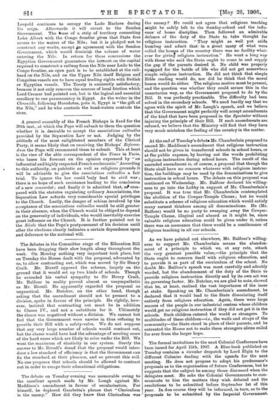As we have pointed out elsewhere, Mr. Balfour's willing- ness
to support Mr. Chamberlain means the abandon- ment of a principle to which we, at any rate, attach the very greatest possible value,—the principle that the State ought to concern itself with religious education, and to provide it as part of the curriculum of the school. No doubt Mr. Balfour's speech was most carefully and adroitly worded, but the abandonment of the duty of the State to provide religious instruction directly and by its own act was its governing factor. Mr. Butcher, we are glad to note, showed that he, at least, realised the vast importance of the issue at stake. Speaking on Mr. Chamberlain's amendment, he declared that it would lead to the State dissociating itself entirely from religious education. Again, there were large masses of the people in our industrial centres whose children would get no religious instruction if they did not get it in the schools. Such children entered the world as strangers. To multitudes of these children—i.e., the waifs and strays of the community—the State stood in place of their parents, and he entreated the House not to make these strangers aliens exiled for ever from the larger hope.










































 Previous page
Previous page